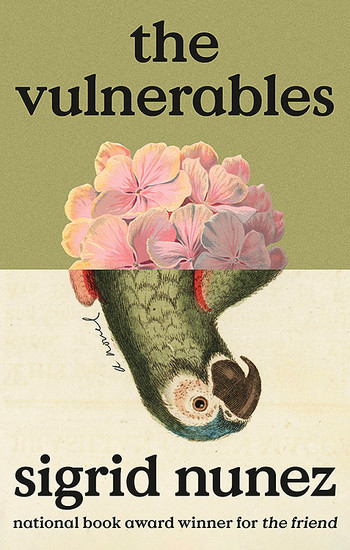With The Vulnerables, a seemingly random, often discursive, thoroughly wonderful new book, Sigrid Nunez ’72BC, ’75SOA has written not so much a novel as another of her virtuoso mash-ups of fiction, memoir, and intellectual rumination (see also The Friend and What Are You Going Through). This signature form clearly owes a deep debt to Virginia Woolf, one of Nunez’s abiding literary heroes. Woolf aspired to write an “essay-novel” that, in Nunez’s words, “included, well, everything.” Woolf envisioned this exciting new hybrid as “a terrific affair” that would embrace “history, politics, feminism, art, literature — in short a summing up of all I know.”
Nunez has created just such a marvelous amalgam here. But fear not: The Vulnerables is not merely a series of literary allusions or digressive meditations on culture and politics, delightful as those essay-like elements are. Happily, Nunez’s empathy, wit, and acute social observations also give rise to great storytelling.
The book’s action kicks in days before the COVID-19 lockdown with an unplanned reunion of the narrator (a sixty-something writer who lives alone in New York City) and four of her former college dorm mates, all of whom bear the names of flowers. Violet, Rose, Jasmine, Camellia, and the unnamed narrator have just attended the funeral of a sixth member of their group, Lily — “The first one of us to get married. The first to have a baby. The first to die.”
The women’s lively conversations, which take place over post-funeral drinks and at breakfast the next day, range from recollections of the deceased’s penchant for extramarital affairs to an analysis of the wholesale demotion of white men in society to Jasmine’s wrenching story about her daughter’s stepson, a high-achieving college student who has been charged with sexual assault. In detailing the last, Nunez manages to shed more light in a few paragraphs on the infinitely thorny sexual politics of today’s college campuses than entire books on the topic have done.
The heart of the story, however, is the narrator’s relationship with a parrot she begins to care for after the pandemic sets in. Here Nunez reaffirms her status, established with the National Book Award–winning The Friend (which explores the close bond between the protagonist and the Great Dane she inherits), as the reigning poet laureate of animal-human relationships. The parrot, a gorgeous macaw named Eureka, belongs to a wealthy New York City couple who are marooned in California when the lockdown begins. The narrator moves in to the couple’s lavish apartment after she relinquishes her own place to a pulmonologist who has come to New York to help with the COVID crisis.
The narrator’s interactions with Eureka, a compelling character in his own right, inspire a wealth of touching and often profound ruminations about animals’ links with humans. “I believe that an affinity with other living things, a desire to be near and connect with them, and a love of natural beauty, are in our DNA,” she muses. “How to square this, though, with what anyone living in our day can see: the human drive to make the world increasingly ugly, and, in the end, to trash it.”
Even the narrator can’t elude this paradox. Feeling creatively blocked and increasingly isolated, venturing outside only to take long walks and to buy food (her age makes her one of the core “vulnerables” of the book’s title), she is nonetheless furious when her solitude is disrupted by the return of Eureka’s earlier caretaker, a troubled NYU dropout whom she dubs “Vetch.” Because neither has anywhere else to go, the pair divvy up the cavernous apartment, sticking to separate zones and meeting only rarely in the kitchen.
Vetch, a good-looking vegan who lacks purpose (but not strongly expressed opinions), loves Eureka as much as the narrator does. As her resentment wanes, the two begin to share space, meals, long chats, cannabis, microdoses of psilocybin, and caramel oat-milk ice cream while “idling another lockdown day away.” Eventually, of course, this sense of stopped time must yield to reality, and Vetch moves out, taking (with the owners’ blessing) Eureka with him. The narrator reclaims her apartment and resumes a semblance of her former life — a life that necessarily means trying to make sense of the experience she has just had.
Woolf never pulled off her dream of an essay-novel: she ended up separating the attempt into two books, a polemic called Three Guineas and the novel The Years. Nunez, however, has the alchemy down pat: The Vulnerables succeeds on every level and includes, well, everything. By Woolf’s or anyone else’s metric, it is a terrific affair.



